Gerald A. Riskin's Blog, page 14
November 30, 2017
Social Media: The Biggest and Most Mysterious Phenomenon of our Time
There are some surprising statistics in the video I am posting here. Have you considered, for example, that “Today’s college students have never licked a stamp”? Did you know that “The fastest growing demographic on Twitter is grandparents”?
Like much other information on the Internet, “Socialnomics 2017” – a 2.5 minute video by digital guru Erik Qualman – offers an intriguing few minutes of diversion. It also provides the latest statistics on the world’s population (more than 50% of people alive today are under 30), our buying habits (93% of buying decisions are influenced by social media), and what technology is doing to human attention spans (it now averages about seven seconds, Qualman says).
Perhaps more importantly, however, after watching the video those involved in professions such as the law that have traditionally depended on “word of mouth” for referrals may find themselves asking, “Can we afford any longer NOT to be involved in social media?”
I don’t think we can.
Let me know your thoughts on this or any other matter related to the law, either in the comments section below or directly via email.
November 23, 2017
Smart Contracts and Crowdsourced Juries
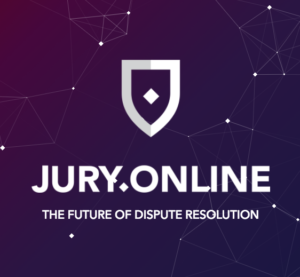 A new start-up company, appropriately named jury.online, is planning to crowdsource juries for the arbitration of contract disputes.
A new start-up company, appropriately named jury.online, is planning to crowdsource juries for the arbitration of contract disputes.
The company, which is based in Estonia, describes itself as “The Future of Dispute Resolution,” although an article on Artificial Lawyer points out that its approach to jury selection raises a number of legal questions, among them: “Is a ruling by a group of anonymous jurors assembled online to rule on the disputed outcome of a smart contract legally compliant and legally binding?”
In a video “explainer,” jury.online states that it is a “blockchain-based platform for carrying out all-purpose deals, executed via smart contract.” Using the platform, entities can enter into a smart contract (e.g., to book a hotel room with an online travel agency), and place the agreed-upon remuneration for the service or product in an escrow account, from which it will be released when the contract is satisfactorily completed. If there is a dispute, jury.online convenes a group of volunteers selected at random on a blockchain system to arbitrate the disagreement and come to a decision.
However – again as Artificial Lawyer points out – the issue at hand is really not the viability of this particular venture (see jury.online’s “Terms and Conditions” for a long list of warnings, caveats, and disclaimers) but rather the avalanche of new platforms and apps that are intended to replace or complement work that has traditionally done by lawyers – without any input from the legal community. For the legal industry, jury.online is simply one more visible peak of an iceberg that is growing underwater by the day.
Please share your thoughts on this or any other matter related to the law, either in the comments section below or directly via email.
November 16, 2017
Will Technologies like 3D Printing Erode Intellectual Property Laws?
A recent post on TechCrunch featured the story of a seven-year-old girl who threw out the first pitch in a recent World Series final game with her new prosthetic hand –one that had been created on a 3D printer.
featured the story of a seven-year-old girl who threw out the first pitch in a recent World Series final game with her new prosthetic hand –one that had been created on a 3D printer.
There is no doubt that 3-D printing is evolving into a significant force for both good and evil (I’m thinking in the latter case of the potential for reproduction of undetectable weapons and even drugs). However, even when the facsimiles are truly beneficial, as in the case of this little pitcher’s hand, advances in 3D printing force a host of rhetorical questions upon the legal community that relate to intellectual property law.
Back in the day, if a person or an entity believed its intellectual property was being compromised, investigations would likely have led to a manufacturing facility and to contractors who were paying to create the copied product. With 3-D printing, it will become much more difficult to enforce IP rights. I wonder if, in the long term, IP rights themselves will become diluted, as opportunities increase to emulate products without a license.
What are your thoughts on where this and similar technologies are going, and the possible legal implications? I welcome your thoughts on this or any other matter related to the law, either in the comments section below or directly via email.
November 9, 2017
Mills Oakley Succeeds with Management from Business Sector

John Nerurker, CEO (Management), Mills Oakley
In my previous post, I addressed the issue of whether law firms should be managed by lawyers or by business experts – and noted that while many lawyers resist the notion of having non-lawyers direct the operation of their firms, the basic principles of business management are essential to law firm success.
This week I would like to introduce you to John Nerurker, who for fourteen years has brought his background in accounting and business to the job of CEO (Management) of Mills Oakley, a commercial practice firm with offices in Melbourne, Sydney, Brisbane, Canberra and Perth.
Mills Oakley, which was established in 1864, today has more than 90 partners and 670 staff, and “a client base of ASX-200 listed companies, mid-sized corporations, the public sector and not-for-profit organisations.” The firm was recently named “Australia’s Fastest Growing Law Firm” by the Australasian Lawyer.
Nerurker works closely with Mills Oakley’s partners to lead the firm’s overall direction and strategy, but of course has no direct input on legal matters. In an article that appeared in the Australiasian Lawyer in 2010, Nerurker explained that Mills Oakley originally hired him because it wanted to break from its traditional approach to management, bringing “new skills and a more business-oriented approach to the table.”
Nerurker believes that “remaining relevant in the delivery of value to clients” is a major issue facing law firms today, and says that “in practical terms, this means prioritising innovation, because the business models in our sector are now evolving so rapidly. The most astute firms will always be looking for ways to refresh service delivery.”
In 2017, Mills Oakley received the prestigious GlobalX Australian Law Firm of the Year Award (101-500 lawyers). With its successes, accolades, and record of growth, the firm has clearly demonstrated that, in its case, choosing a non-lawyer to manage the team has been a wise decision.
In the spirit of disclosure, I have had the honour of serving the firm.
I welcome your thoughts on this or any other matter related to the law, either in the comments section below or directly via email.
October 26, 2017
Lawyers or Business Experts: Who Should Be in Charge?
 It is not a new debate, but the question is perhaps more relevant than it has ever been before: Should lawyers or business wizards manage law firms?
It is not a new debate, but the question is perhaps more relevant than it has ever been before: Should lawyers or business wizards manage law firms?
A recent article by Casey Sullivan in Bloomberg Big Law Business profiles chief operating officers at major US law firms that have chosen to put business and finance experts in charge of operations, rather than lawyers. Interviewees include Craig Courter at Katten Muchin Rosenman, John Yoshimura at McDermott Will & Emery, and Victor Núñez, COO of the Americas at White & Case. These individuals discuss the challenges they face – including the not-unexpected skepticism of many lawyers – as they work to advance cutting-edge business practices in law-firm settings.
Many lawyers believe that only someone trained in the law can properly address such issues as attracting clients and hiring new lawyers. However, as big law firms become larger and more global, as law-related technology grows increasingly powerful and influential, and as competition becomes more intense – both among law firms and between the law and other sectors – many firms are reassessing their long-held theories regarding who can best maximize such areas as client development, marketing, and human resources, not to mention financial operations.
The debate about who should run the show in law firms speaks not only to the evolution of the profession, but also to the need for more business courses in law schools and a greater emphasis on business topics in professional development training. Whether a law firm is managed by a lawyer or a business expert, the basic principles of successful business operations cannot be overlooked by any firm that hopes to turn a profit.
Note: See next week’s post for an example of a very successful law-firm leader who is not himself a lawyer. In the meantime, let me know your thoughts on this or any other matter related to the law, either in the comments section below or directly via email.
October 19, 2017
Bringing Blockchain Transactions into the Legal Domain
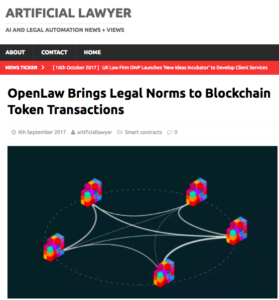 The Artificial Lawyer reports on a new system that is intended to ensure the legality of contracts based on tokens that are used on the Ethereum blockchain platform, rather than on established legal tender.
The Artificial Lawyer reports on a new system that is intended to ensure the legality of contracts based on tokens that are used on the Ethereum blockchain platform, rather than on established legal tender.
Ethereum is “an open-source, public, blockchain-based distributed computing platform featuring smart contract (scripting) functionality” (Wikipedia). Its tokens, called “ether,” may be used like currency or represent other real-world assets such as “a virtual share, a proof of membership or anything at all” (Ethereum).
Ethereum’s smart contracts have until now been created by individuals who are more familiar with technology than with the law. The new system – created as part of OpenLaw, a “smart contract” project being developed by lawyers in the US and Switzerland – is intended to provide legal constructs that will offer lawyers more confidence in such contracts.
“The OpenLaw purchase contract seeks to provide legal contracting norms that any commercial lawyer would recognise,” the article states, “adding in key transactional clauses and provisions, as well as the ability to modify the terms as needed.”
Please note that while I am not yet comfortable recommending that lawyers deal with contracts of this nature – the head of the IMF, among others, continues to warn of the volatility of cryptocurrency – I do think we should know enough to speak intelligently about on-chain transactions with our clients. It is probably wise to assign a lawyer or lawyers in the firm to keep an eye on developments related to cryptocurrency and blockchain technology, and to provide internal updates to fellow lawyers on a periodic basis. The Artificial Lawyer article is thorough and balanced, and is a good place to start to acquire knowledge in this area if you haven’t done so already.
I invite you to share your thoughts on this or any other matter related to the law, either in the comments section below or directly via email.
October 12, 2017
Virtual Reality and the Law Firm
 An article by George Khoury, Esq. on the FindLaw legal technology blog reports on digital advances that could ultimately lead to the existence of entire augmented- or virtual-reality law offices – where our colleagues appear as 3-D images and our documents seem to be suspended around us in thin air.
An article by George Khoury, Esq. on the FindLaw legal technology blog reports on digital advances that could ultimately lead to the existence of entire augmented- or virtual-reality law offices – where our colleagues appear as 3-D images and our documents seem to be suspended around us in thin air.
Khoury invites us to imagine “showing up to court as a fully suited up lawyer hologram, while really just eating cereal in our pajamas on the couch.”
Such visions are not likely to become viable realities for another decade or so, Khoury acknowledges, but bringing them to life is already the focus of such companies as Meta, a start-up founded by Meron Gribitz, who studied neuroscience and computer science at Columbia, and Envelop VR of Bellview WA, whose headset-accessible platform already runs applications – from YouTube to Excel worksheets – in virtual reality.
Khoury predicts that the use of augmented or virtual reality will be “a real boon” for law offices, although significant refinements to both hardware and software will be required before the technology will appeal to most of us. Still, while the VR law office may still be a vision for the future, that vision is certainly within reach, and it is of more than diversionary interest to keep an eye on developments in this field.
I invite you to share your thoughts on this or any other matter related to the law, either in the comments section below or directly via email.
October 5, 2017
PwC’s U.S.-based Law Firm to Advise on International Matters
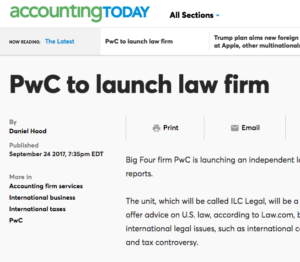 Accounting Today reports that accounting giant PwC is about to open a law firm in the U.S. The article, compiled from various sources by Daniel Hood, points out that this constitutes a significant new development in what many see as an increasing encroachment by accounting firms into the legal services marketplace.
Accounting Today reports that accounting giant PwC is about to open a law firm in the U.S. The article, compiled from various sources by Daniel Hood, points out that this constitutes a significant new development in what many see as an increasing encroachment by accounting firms into the legal services marketplace.
The firm, to be called ILC Legal, will operate independently of other PwC interests, and according to the article will not offer clients advice on U.S. law, but rather on international legal matters – “such as international corporate structuring, M&A, immigration, and tax controversy.”
The Accounting Today article reports that “69 percent of law firm leaders view [accountants who are moving into the legal-services market] as a major threat.”
I welcome your thoughts on this matter – or any other issue related to the law – either in the comments section below or directly via email.
September 28, 2017
Adaptability a Key to Lowering Project-Related Stress, Says Logistics Company CEO
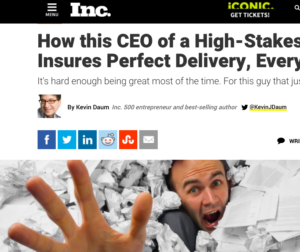 If you have ever become flustered or agitated under pressure – and who hasn’t? – you might want to read the profile of Franz-Joseph (FJ) Miller that was recently published on Inc. Miller is the founder and CEO of the time:matters Group, a “high-stakes logistics company” that prides itself on “perfect delivery, every time.”
If you have ever become flustered or agitated under pressure – and who hasn’t? – you might want to read the profile of Franz-Joseph (FJ) Miller that was recently published on Inc. Miller is the founder and CEO of the time:matters Group, a “high-stakes logistics company” that prides itself on “perfect delivery, every time.”
Kevin Dunn, who interviewed Miller for his podcast and the article, describes time:matters as “a business dedicated to providing emergency assistance with over 500 destinations in 90 countries to companies like Siemens, Volkswagen and DHL [Express]… delivering everything from jet engines to stem cells under conditions of huge uncertainty.” Obviously, the mandate of this company practically guarantees that stress will be part of every transaction.
So how does Miller avoid the debilitating downsides of the pressure-based anxieties that characterize so many business encounters? Dunn shares a few of Miller’s “secrets,” which include “Create a culture of adaptability, not perfection,” and “Plan to manage. Don’t manage to plan.” A “culture of adaptability” requires flexible team members who are willing and able to change their approaches depending on the circumstances, and adaptability is also the key to “planning to manage” because, as Miller says, “You can’t plan every situation” in advance.
Although managing legal matters is very different from delivering spare parts to Moldova on time, the human response – stress – that often accompanies such undertakings is likely to be the same. Check out Miller’s five strategies to see if there is something you can add to your own approach to stress-management.
I invite you to share your thoughts on this or any other matter related to the law, either in the comments section below or directly via email.
September 21, 2017
Law Firm Senior Management Underrepresented at CLOC Conference
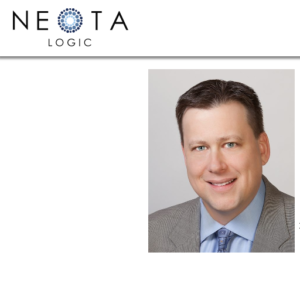
Patrick Fuller of Neota Logic
At its second annual conference in Las Vegas in May 2017, the Corporate Legal Operations Consortium (CLOC) offered professional development sessions on a range of topics to more than 1000 attendees – twice the turnout of its first conference, which was held a year ago.
CLOC describes itself as a “non-profit organization consisting of legal operations professionals providing education, sharing best practices, networking, establishing a professional organization and community, and driving positive change across the corporate legal services ecosystem… deliver[ing] corporate legal support to small, medium and large businesses ….”
A review of the CLOC conference by Patrick Fuller, vice president of business development at AI software producer Neota Logic, makes interesting reading. He notes that attendance at all of the educational sessions was high, especially those dealing with AI and analytics. However, Fuller also observes that law firm management was inadequately represented at the conference – a fact that does not bode well for firms that want to be in the forefront of legal operations technology.
Fuller said that he had never seen so many senior management representatives from industry vendors at a conference before, demonstrating the growing interest not only in legal operations but also in CLOC. He also noted that “the automation of repetitive legal tasks is increasing,” and that legal operations professionals are having a significant impact “on their legal departments and the business of law as whole.”
Fuller predicts that attendance at the 2018 CLOC symposium will double again, which means that this conference is one that law firms – and especially their senior executives – cannot afford to miss.
You are welcome to share your thoughts on this or any other matter related to the law, either in the comments section below or directly via email.



